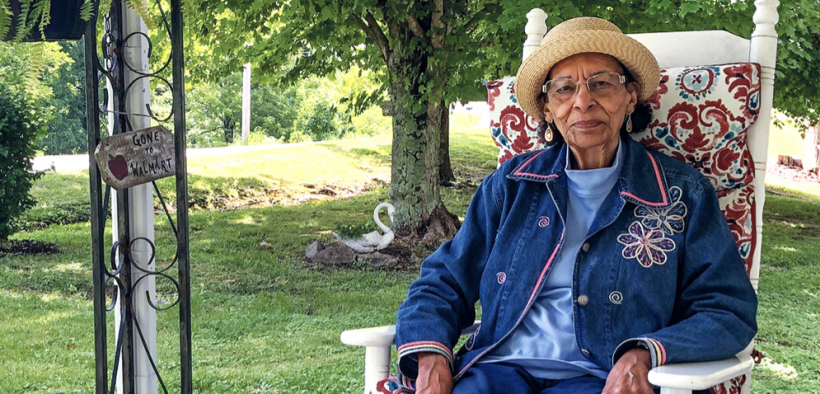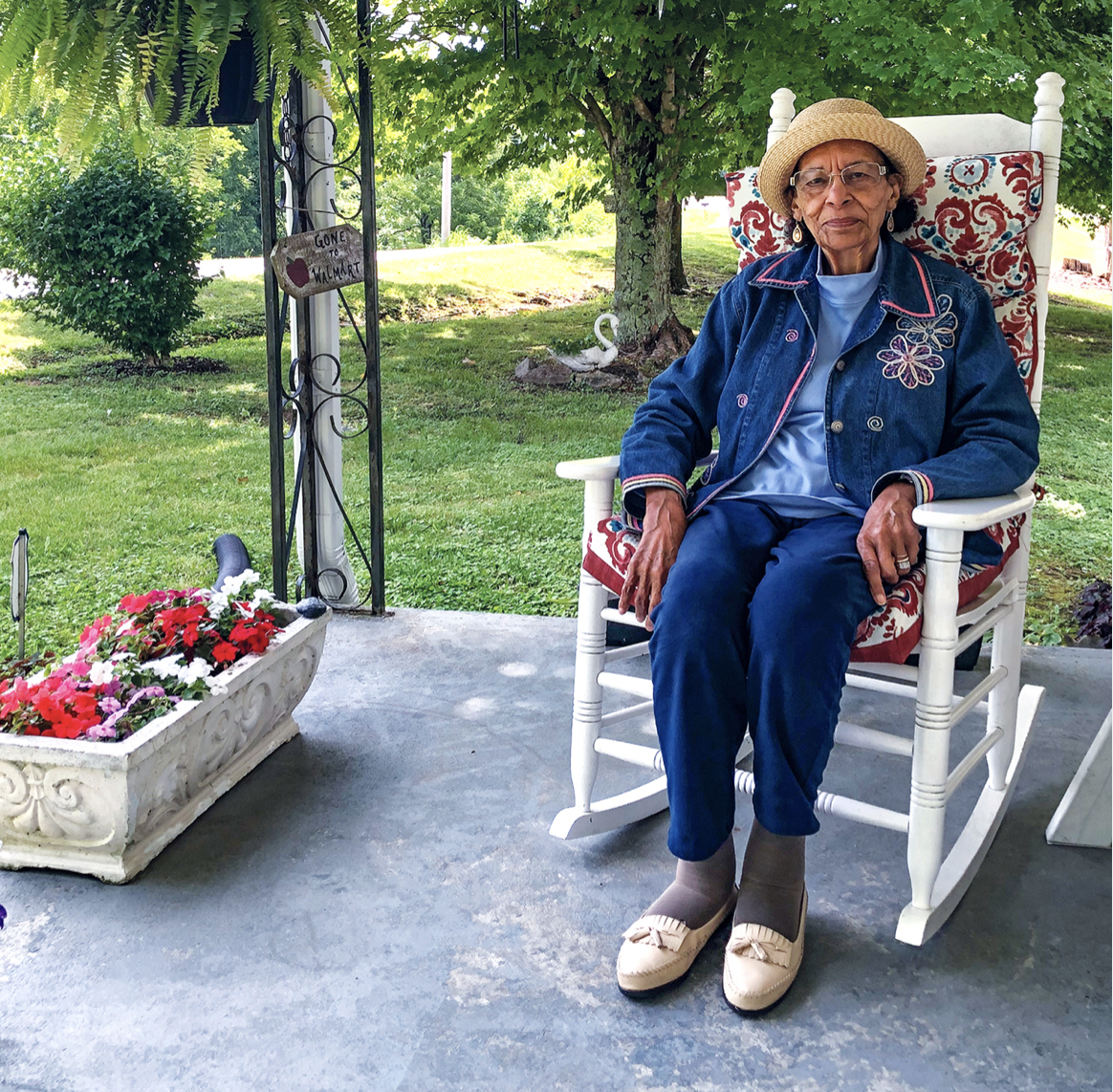90-Year-Old Keeps Watch Over Historic Black Church And Schoolhouse In Tennessee

From her front porch, adorned with periwinkles and impatiens, Evelyn Buck keeps watch over a small piece of American history.

The 90-year-old believer is the lone sentinel of the West End Church of Christ at Silver Point, where a thriving community of Black Christians served orphans, taught schoolchildren, launched cottage industries, and trained gospel preachers in the early 1900s.
The 105-year-old church building sits on a lonely stretch of Center Hill Dam Road, off Interstate 40 in unincorporated Putnam County, an hour east of Nashville. Buck’s small, tidy home with light yellow siding is just around the corner from the unassuming red-brick structure, which was added to the National Register of Historic Places in 2007.
Sitting on a white rocking chair, socially distanced from a Christian Chronicle reporter, she talked about the countless days she spent at the church building, which doubled as her school. A slight breeze rattled the wind chimes above her head as a pickup truck roared by, briefly interrupting her story.
“It’s like a speedway,” she said, more bemused than irritated.
Of course, she remembers the days when the road was gravel and dirt. She’s walked it countless times, to school and to Sunday worship.
“We had dusty feet,” she said, “just like in biblical times.”
The ‘duty of the church’
Her father, Corinth “Jack” Garrett, farmed tobacco. Evelyn, the oldest of her siblings, helped with the harvest in the early years. “I hated it so bad, I never smoked,” she said.
The family was part of a community of Black farmers who came to Tennessee’s Upper Cumberland region before the Civil War. They were among “the first generation of Blacks not threatened by enslavement, yet entrenched in Jim Crow,” wrote Althea Armstrong, a descendant of the Silver Point Christians, in the application for historic status.
That school grew out of a desire to break the cycle of poverty experienced by rural Blacks in the post-Reconstruction era, Armstrong wrote, based on interviews she conducted with the farming families. Devout Christians, they had concerns for their children’s education and faith—concerns later voiced by author Carter G. Woodson, often called “the father of Black history,” in his 1933 book “The Mis-Education of the Negro.”
“Negro’s Christianity does not conceive of social uplift as a duty of the church,” Woodson wrote in the book, which Armstrong quoted in the application, “and consequently Negro children have not been adequately trained in religious matters to be equal to the social demands upon them.”
Concerned parents found a sympathetic ear in G.P. Bowser, a renowned Black minister who preached for the Jackson Street Church of Christ in Nashville and helped launch a Christian school there in 1907.
In 1909 Bowser preached for the Laurel Hill Church of Christ, which met near what is now Center Hill Dam. The farmers, along with ministers Sam Womack and Alexander Campbell (no relation to the Restoration Movement leader from the 1800s) recruited Bowser to help plant a church in Silver Point and to deliver faith-based education to the youths there.
Bowser moved the Christian school to Silver Point, where it was named Putnam County Normal and Industrial Orphanage. Evelyn’s father and other farmers hitched teams of mules to their wagons to haul bricks for the construction of a classroom and dormitory.
Bowser and P.H. Womack, daughter of Sam Womack, taught Bible, Latin, history, and music. In 1913 the school was reorganized into the Silver Point Christian Institute, offering classes through eighth grade. By 1915, when the historic chapel was constructed, the school had 63 students.
Tuition was between 50 cents and $1 per month, plus $6 per month for room and board.
Cottage industries sprang up around the school, which sold produce from a garden on its 8-acre property to help cover expenses. The school also produced The Christian Echo, a newspaper launched by Bowser in 1903. Evelyn’s aunt worked in the print shop.
Despite these efforts, finances were unsteady. Bowser resigned in 1918, but his drive for Christian education later resulted in the establishment of the Nashville Christian Institute, which operated from 1942 to 1967, and Southwestern Christian College, the only historically black Christian higher education institution associated with Churches of Christ, which is still in operation.
In the application for historic status, Armstrong quoted the King James Version of James 2:18: “Yea, a man may say, Thou hast faith, and I have works: shew me thy faith without thy works, and I will shew thee my faith by my works.”
“The structure that is the West End Church of Christ at Silver Point is a work of faith,” Armstrong wrote, “by faithful Black farmers to establish faith-based learning.”
Gospel meetings and hickory nuts
The West End church’s history didn’t end with the institute. The church continued to meet in the chapel and hosted annual gospel meetings with ministers including J.S. Winston, R.N. Hogan, G.E. Stewart, and Levi Kennedy.
Hundreds heard the gospel and were baptized, including Evelyn, who at age 12 was immersed in the waters of the Caney Fork River by Alfred Rucks, a preacher from Lebanon, Tennessee.
“I said, ‘I want to be ready when Jesus comes,’” Evelyn recalled. She remembered special Sundays when a family would come to visit from Wolf Creek, about eight miles away, in a horse-drawn buggy. They let her ride in it on occasion. “That was family,” she said.
The old dormitory didn’t survive, but the church building became a one-room school for Silver Point’s children. One teacher taught eight grades. Evelyn followed her older cousins to school at age 5. By the time she enrolled in kindergarten, she could read and spell.
“We would go out at recess and get hickory nuts off the tree, crack them, and eat them,” she said, standing on the historic church grounds near a slope that students navigated to get water. The school had no indoor plumbing.
After eighth grade, Evelyn had to make the 20-mile journey to Cookeville to attend Darwin High School, the only secondary school for Blacks in the area. She stayed there with relatives during the cold winters.
She graduated salutatorian of her class in 1950 and married a few years later. She moved to Nashville and raised three boys and two girls. The children followed in her footsteps and were baptized.
When her son, Walter, was immersed, she watched with tears in her eyes. “My youngest son was sitting beside me,” she said. “He looked up at me and said, ‘Mom, don’t cry. He can swim.’”
A place of pilgrimage
Evelyn’s husband died in 1979, and she returned to Silver Point to care for her aging parents. They are buried in the cemetery next to the church building alongside many of the pioneering families who built the church and school.
Most of their children and grandchildren have moved away, and the church stopped meeting in 1996. Evelyn now worships with the Silver Point Church of Christ, a predominantly White congregation about a mile from her home.
“That’s my family now,” she said.
The West End church building continued to serve as a site for annual pilgrimages by former members and their children until 2020, when COVID-19 halted the gatherings.
The descendants of Silver Point pray that those reunions can resume, said Armstrong, who wrote the historic status application. She praised Evelyn and Virgil Carr Jr., a former elder of the West End church who now lives in Florida and organizes the reunions.
Armstrong’s mother, Joyce Ferrell Armstrong, has a headstone in the cemetery next to the West End church building. It reads, “Keep the Faith.”
That’s what Evelyn Buck and Virgil Carr are doing, Armstrong said, serving as living links to a shared heritage.
“The West End Church of Christ is living water for these two,” she added.
Prayers to forgive
An American flag flies in Evelyn’s front yard—a tribute to her two sons and a son-in-law. Each served in the military.
When asked about the years of segregation she endured and the ongoing racial tensions in the U.S., she responded, “My mother taught us not to be bitter, that we’re just as good as anyone else.”
Among her favorite Bible verses are the Psalms of David, when the mighty king of Israel humbled himself before the Lord. “He was so willing to ask for forgiveness,” she said. “I pray about that all the time, that I’ll be forgiving. It’s not easy, but it is for me now, at this stage of my life.”
As she considers the historic building just around the corner, “it makes me appreciate things now, the good things that I have now,” she said. “We’ve come a long way, all of us have.”
This story first appeared in the Christian Chronicle.



